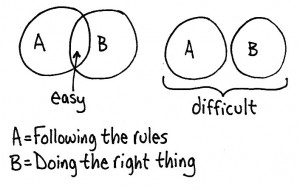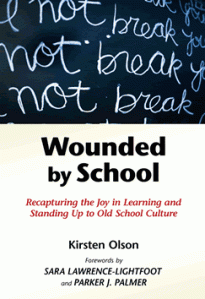 You might have seen the article in Forbes by Jessica Hagy that recently was shared by the many who would wish for a different learning environment for the world. Her list of 9 things that school taught you that would make no sense if not in the context of memory rang true for most of us, I am sure. But I found the responses to my posting of it in Facebook interesting. Much like my post earlier this year comparing public school failure with the denial of slavery’s inherent evil that frustrated abolitionists, there are some who see no problem with our current system or the system they were in (survived) when they were young—which, of course, resembles in most measures the system we are sending our children through today.
You might have seen the article in Forbes by Jessica Hagy that recently was shared by the many who would wish for a different learning environment for the world. Her list of 9 things that school taught you that would make no sense if not in the context of memory rang true for most of us, I am sure. But I found the responses to my posting of it in Facebook interesting. Much like my post earlier this year comparing public school failure with the denial of slavery’s inherent evil that frustrated abolitionists, there are some who see no problem with our current system or the system they were in (survived) when they were young—which, of course, resembles in most measures the system we are sending our children through today.
Understanding why people cannot sense the distinct differences between a joyful, empowering, enlightening learning experience and that which the clear majority of adults experienced and the children of the world currently experience is fundamental to what All New Public Education is all about. For every person who agrees with me that there is a need to start from scratch to build a better system, there are 100 who think the system is just fine, or can be fixed with, in essence, a few tweaks and more money.
Just how insidious the damage is that can be wrought by the current public education system is the subject of a book by Kirsten Olson I have recently read, Wounded By School. In the remarkable foreword by Sara Lawrence-Lightfoot, the true value of Kirsten’s work is summarized by this statement:
At this time, when the public discourse about schooling tends to focus on the quantifiable indices of access, achievement, and opportunity, when the measurements of inequality use a rhetoric that is literal and objectifying, when educators and policymakers tend to be preoccupied with “achievement gaps,” with “high-stakes testing,” and with statistically based assessments and accountability, Olson raises up another specter of injustice that is more randomly spread. She speaks about the wounds of schools that cannot be easily classified by race, class, or gender, by the disadvantages of disability or giftedness, by the things visible or countable. … But she also, importantly, underscores the ways in which people who seem to thrive and excel—the perfectionist, the overachiever, the valedictorian, the brilliant athlete—may also be carrying around the pain that dulls curiosity, limits creativity, stifles imagination, and ultimately may one day lead to inertia and depression.
In an equally inspired second foreword by Parker J. Palmer, he adds:
Equally sad and profoundly ironic is the wound that may be the most widespread of all: the eagerness to learn that we all bring to the world as infants is often diminished and even destroyed by our schooling.
The wounds of schooling do not belong to students alone. They are frequently shared by teachers.
Yes, there are teachers and parents who participate in the wounding of children, adults who have grown so numb (and dumb) that they have lost touch with the feeling-life of the child, adults who subject the children in their care to the same kinds of cruelty that led to their own deformation.
And so begins a powerful examination of what so many of us experienced in our public and private schools:
- Wounds of creativity
- Wounds of compliance
- Wounds of rebelliousness
- Wounds that numb
- Wounds of underestimation
- Wounds of perfectionism, and
- Wounds of the average
 Olson based this book on interviews to support her own research while a Masters of Education candidate at Harvard. She speaks of how “almost immediately I began hearing stories about educational wounding. Although in this project I was speaking with very “successful” individuals … individuals who felt that learning was at the center of their lives, as I tried to capture their educational biographies, nearly every one of them told me they felt they had a lot to recover from in their school experiences, and that their learning lives had developed primarily outside of, or in opposition to, their experiences in school.”
Olson based this book on interviews to support her own research while a Masters of Education candidate at Harvard. She speaks of how “almost immediately I began hearing stories about educational wounding. Although in this project I was speaking with very “successful” individuals … individuals who felt that learning was at the center of their lives, as I tried to capture their educational biographies, nearly every one of them told me they felt they had a lot to recover from in their school experiences, and that their learning lives had developed primarily outside of, or in opposition to, their experiences in school.”
The stories Kirsten recounts are gripping and make for engaging reading. But more importantly, there are few aspects of any of them that I could not remember either going through myself or feeling that I had witnessed similar scenarios happen to my friends or children of friends I know now or have known. I would posit that the depth that Olson goes into would shake a scintilla of recognition from even the most hardened advocate for sustaining the current system. Who can deny that—at the macro level—schools (as represented by teachers and administrators) are “more focused on managing kids’ behaviors than fostering their academic growth”? And even more disturbing, the government-fostered perception that “If you get good grades, test well, and overall do well in school, you are intelligent, but if you do poorly, you are not intelligent.”
This deep dive into the unintended consequences of a system whose effects rob us all of our creativity, flexibility, understanding, higher cognitive ability, and social confidence is critical reading for everyone: educators, administrators, legislators, parents, and students. For the many parents who have been suckered into thinking it’s acceptable to hold their public school responsible for taking care of their child from age 5 or earlier to age 18, Wounded By School is a wakeup call. True, there are bright spots, there are the Sudbury Valley Schools that allow for student-centric learning. There are the halfway houses (charter schools) that allow for some individualized programming, though still heavily supervised by an adult. But the clear majority of public and private schools use conformity as a measure of success, testing as a measure of results, and ignore the rights of the individuals trusted in their care to seek, find and express their inner calling, their true passion.
Kirsten Olson is a saint. As a consultant, she willingly enters one school district after another to identify and document what is a repetitive and monotonous scenario: these few teachers respect the child and thrive in spite of the environment and system, the rest are here to get through the day without hitting anyone. Olson writes that “School administrators often function as barriers to parents and “protectors” of the teachers, “doing their job” when they keep parents from intruding into the classroom or the instructional workings of the school.” The more enlightened of these will allow her to walk the halls, observe classes, and speak with their various communities, but to what degree they will agree with her assessments and recommendations is anyone’s guess. And in the quagmire of a system that is based on an incorrect foundation, one school on stilts above it will not last long, much less make a difference.



